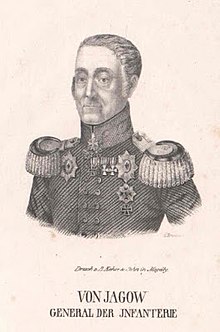Friedrich Wilhelm von Jagow
Friedrich Wilhelm Christian Ludwig von Jagow (born September 8, 1771 in Wolfshagen , † December 2, 1857 in Berlin ) was a Prussian general of the infantry and Canon of Brandenburg .
Life
family
Friedrich Wilhelm Christian Ludwig von Jagow came from the old Brandenburg noble family von Jagow . His parents were Friedrich Adolf Achaz Burchard von Jagow (* January 24, 1735 - May 18, 1809) and his wife Elisabeth Gans Edle zu Putlitz (* May 3, 1746 - June 19, 1829). His older brother Ludwig Friedrich Günther Andreas (1770–1825) became a Prussian major general, his younger brother Christoph Friedrich (* June 8, 1780; † October 14, 1839) was a Prussian captain a. D.
Military background
He joined the Prussian army in 1785 and became adjutant general to general Alexander Wilhelm von Arnim in September 1805 . During the Fourth Coalition War in 1806 he took part as a captain in the Battle of Auerstedt (October 14, 1806), but was taken prisoner by the French at Prenzlau . Promoted to major in June 1807 after his release , Jagow was commander of a battalion in the Guards Regiment on foot and in December 1809 commander of the Guard Jäger battalion and inspector of the East Prussian Jäger and Silesian Rifle Battalions.
On March 10, 1813, he became the commander of the 10th Infantry Brigade in the II Army Corps and took part in the battle of Großgörschen on May 2, 1813 with his large unit . He was wounded in the process. In the following battle near Bautzen he fought with distinction and received the Iron Cross, 2nd class. On June 4, 1813 Jagow was promoted to lieutenant colonel and appointed brigade chief. During the autumn campaign of 1813 he took part in the battles near Dresden (August 26 and 27, 1813) and Kulm (August 29 and 30, 1813). He was promoted to colonel on September 5, 1813 . In the Battle of the Nations near Leipzig (October 16-19, 1813) he fought again with distinction and received the Iron Cross First Class. In December 1813, Jagow was appointed major general.
In the campaign against France in 1814 Jagow was involved in the battles at Reims (March 13, 1814), Avesnes, Compiègne and N Teil, and the Battle of Paris (March 30, 1814). He received the Imperial Russian Order of George IV. Class and, after the Battle of Paris, the Order of the Red Eagle III. Class. In March 1815 he led the Prussian troops in the Duchy of Berg on an interim basis as brigade chief . In May 1815 Jagow was commander of the 3rd Brigade in the I. Prussian Army Corps. With this brigade he fought in the summer campaign of 1815 in the battles at Ligny (June 16, 1815) and Waterloo (June 18, 1815) and received the order Pour le Mérite with oak leaves and the Order of the Red Eagle, 2nd class.
In 1818 Jagow was promoted to lieutenant general, commander of the 8th Division and in 1821 commanding general of the IV Army Corps . In 1825 he received the Order of the Red Eagle, 1st class. Promoted to general of the infantry in 1832, Jagow was appointed chief of the 26th Infantry Regiment in the same year . On September 14, 1833, he was made a Knight of the Order of the Black Eagle , the highest honor in the Prussian state. In 1836 the highly decorated officer celebrated his 50th anniversary in service. On March 12, 1836, he was granted the requested farewell with an annual pension of 6,250 thalers . On April 10, 1847 he was awarded the chain to the Order of the Black Eagle.
Friedrich Wilhelm von Jagow died on December 2, 1857, at the age of 86 in Berlin. He was an honorary citizen of Erfurt since 1825 and of Magdeburg since 1835 .
Marriage and offspring
He married Elisabeth Charlotte Sophie von Jagow on October 31, 1834 (* January 23, 1799 - November 22, 1869). The couple had a son:
- Matthias Wilhelm Ludwig Friedrich Karl (* May 2, 1838; † 1919) ⚭ 1876 Countess Albertine Henriette Kordula Luise Auguste von Behr-Negendank (* August 17, 1856 - November 26, 1888), daughter of the politician Ulrich von Behr-Negendank
literature
- Hermann Hengst: The Knights of the Black Eagle Order. Alexander Duncker, Berlin 1901, p. 166.
- Gustaf Lehmann: The knights of the order pour le mérite. Volume 2, Mittler, Berlin 1913, pp. 351-352.
- Detlef Wenzlik: Waterloo III The campaign of 1815 - The generals. VRZ Verlag, Hamburg 2008, ISBN 978-3-931492-28-2 , pp. 29-30.
- Leopold von Zedlitz-Neukirch : New Prussian Adelslexicon . Vol. 3, Gebrüder Reichenbach, Leipzig 1837, p. 23. (digitized version)
- Yearbook of the German nobility . Volume 1, 1896 p. 854.
Web links
- Portrait of Friedrich Wilhelm von Jagow in Digital Portrait Index
- Friedrich Wilhelm von Jagow in the German biography
Individual evidence
- ↑ In older literature, Christian is sometimes given as a given name
| personal data | |
|---|---|
| SURNAME | Jagow, Friedrich Wilhelm von |
| ALTERNATIVE NAMES | Jagow, Friedrich Wilhelm Christian Ludwig von |
| BRIEF DESCRIPTION | Prussian general of the infantry, Canon of Brandenburg |
| DATE OF BIRTH | September 8, 1771 |
| PLACE OF BIRTH | Wolfshagen (Uckerland) |
| DATE OF DEATH | December 2, 1857 |
| Place of death | Berlin |
